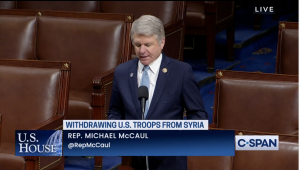McCaul Speaks on House Floor Against Removing U.S. Armed Forces From Syria
Washington, DC- This week, House Foreign Affairs Committee Chairman Michael McCaul spoke on the House Floor in opposition to H.Con.Res.21, Directing the President, pursuant to section 5(c) of the War Powers Resolution, to remove the United States Armed Forces from Syria.
– Chairman McCaul delivered the following remarks-
Mr. Speaker,
The United States is not at war with Syria.
Rather, the United States is conducting limited but important counterterrorism operations in Syria against ISIS — formerly known as al Qaeda in Iraq — pursuant to the 2001 counterterrorism AUMF.
Those operations are being reported regularly to Congress, consistent with the War Powers Resolution. They are not new or unique to the Biden administration.
In fact, let me quote President Trump about what we are doing there:
When he said quote: “A small presence of United States Armed Forces remains in strategically significant locations in Syria to conduct operations … against continuing terrorist threats emanating from Syria….”
These ongoing operations, which the United States has carried out with the assistance of numerous international partners, [have] been successful in seriously degrading ISIS capabilities in Syria and Iraq.” End of quote.
When ISIS was at the peak of its power in 2015, it controlled vast territory in Iraq and Syria, which it used to launch attacks in the Middle East and beyond.
Those terrorists ruled with medieval brutality. We all remember the graphic videos of ISIS fighters beheading journalists and innocent civilians.
These monsters drew thousands of foreign volunteers to join their ranks in Iraq and Syria, and inspired terrorist attacks around the world.
Our U.S. military, working with a global coalition and local forces on the ground, helped to dismantle and destroy this vicious caliphate.
I am proud that our men and women in uniform answered the call to fight this menace – which threatened the United States and the world.
Even though ISIS no longer controls significant territory, there are still tens of thousands of hardened terrorist fighters in Iraq and Syria who are hell bent on re-establishing their terror state.
In the last quarter of 2022, ISIS claimed 72 attacks in Iraq and Syria, including several IED attacks.
Thankfully, our small deployment of U.S. service members is remarkably effective at working with local partner forces to achieve results – and ensure the enduring and complete defeat of ISIS. Otherwise these numbers could have been much worse.
In 2022, we were involved in 108 partner and 14 unilateral operations, killing 466 ISIS operatives and detaining 215 others.
None of us want our soldiers overseas in harm’s way any longer than is absolutely necessary.
I understand that the gentleman from Florida has introduced this resolution in response to a February 17th operation to kill an ISIS leader, in which four U.S. servicemembers were wounded.
Any injured or killed servicemember is a tragedy.
We are eternally grateful for the sacrifices made by our men and women and uniform, and their families, and never take them for granted.
And it is our responsibility as Members of Congress to re-assess on an ongoing basis whether their deployments, and the risks they involve, are necessary.
In doing that, we must recall President Obama’s disastrous decision to prematurely withdraw our troops from Iraq in 2011.
A few short years later, American troops returned to fight the deadly ISIS caliphate, which grew out of the al Qaeda presence that had not been defeated.
The Chairman of the Joint Chiefs General Milley was in Syria just days ago to see our troops and assess the state of our mission. He went there to figure out what value this mission holds for our security.
He said, and I quote:
“Unless you support and devote the correct amount of resources to it, things will get worse…if you completely ignore and turn your back, then you’re setting the conditions for a resurgence.” End quote.
This is why I strongly oppose this resolution directing the removal of United States Armed Forces from Syria. And I urge my colleagues to do the same.
If we withdraw our troops from Syria now, we could see a resurgence of ISIS or another lethal successor in a short time.
Withdrawal of this legal, authorized U.S. troop deployment must be based on the total defeat of ISIS.
Let me be clear: Congress’s power to declare war is one of our most solemn Article One responsibilities.
And I understand why some in this chamber are uncomfortable with using a 22-year-old force authorization for current operations.
I believe we should be working together in a bipartisan manner to have an updated, replacement to this AUMF to address the current threat environment – while also keeping Congress engaged with our constitutional responsibilities.
But this resolution does not work toward that end.
I believe it would call to an artificial withdrawal and it would be a win for the ISIS terrorists committed to our destruction.
The bottom line is, the premise upon this resolution, as a parliamentarian, doesn’t make fact fact-based determinations. The premise of this whole thing is that there’s no authorization for troops to be in Syria today – it’s just not accurate. And in fact, it’s wrong because in [2016], the ISIS threat was addressed under presidential authorities under the 2001 AUMF.
I remember being in the White House with President Trump addressing this crisis as well, about what to do about Syria and whether we believe our U.S. troops should remain at a very small footprint of 900 soldiers in Syria. And at that time President Trump made that decision, under the 2001 AUMF to keep these troops in country.
And I believe that was the correct decision, and I stand by that and urge my colleagues to join me in this opposition and I reserve the balance of my time.
###
